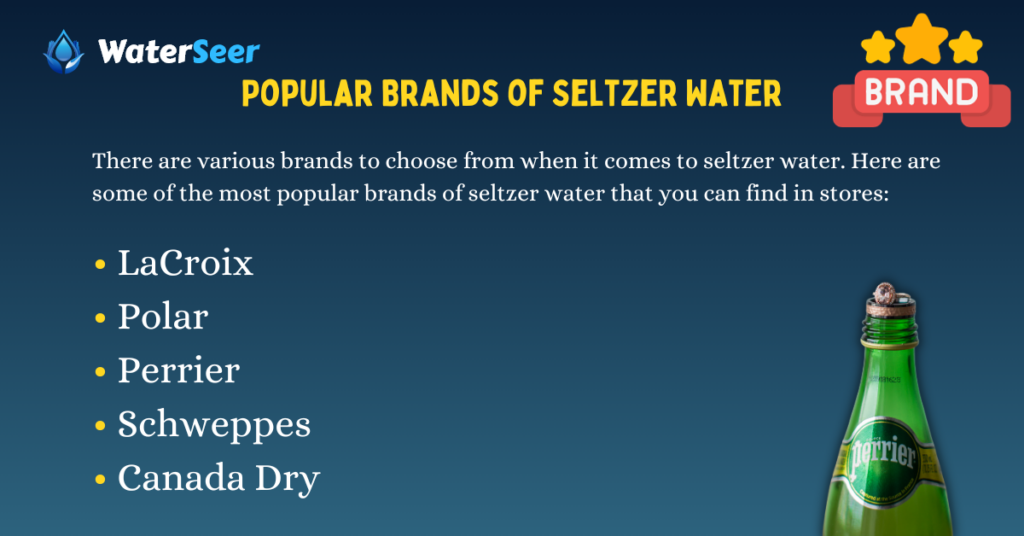If you’re a fan of sparkling water, you may have come across seltzer water on the shelves of your local grocery store. But what exactly is seltzer water, and how does it differ from other sparkling water?
Today, seltzer water is typically made by artificially carbonating water. Seltzer water is often used as a mixer in cocktails, but it can also be enjoyed as a refreshing and calorie-free alternative to soda. In this article, we’ll explore the definition of seltzer water, its history, production process, uses, benefits and drawbacks, and popular brands.
Key Takeaways
- Seltzer water is carbonated water made by dissolving carbon dioxide gas in water.
- It is named after Selters in Germany, where natural carbonated water was first discovered in the 18th century.
- Seltzer water is often used as a mixer in cocktails, but it can also be enjoyed as a refreshing and calorie-free alternative to soda.
Definition of Seltzer Water

Seltzer, or sparkling water, is carbonated water infused with carbon dioxide gas to create bubbles. It is a popular beverage often consumed as a substitute for soda or other sugary drinks. Seltzer water is also used as an ingredient in various cocktails and mocktails.
Seltzer water is made by forcing carbon dioxide gas into water under high pressure. The carbon dioxide dissolves in the water, creating carbonic acid, which gives the water its characteristic fizz. Seltzer water contains no added sweeteners or flavors, making it a calorie- and sugar-free alternative to soda.
Seltzer water is often confused with other types of carbonated water, such as club soda and tonic water. However, there are some critical differences between these beverages.
History of Seltzer Water
Seltzer water, also known as carbonated water, has existed for centuries. Its origins can be traced back to the late 18th century in Europe, where it was first bottled and shipped worldwide. The name “seltzer” comes from Selters in Germany, where the water was first bottled and sold.
In the early 19th century, seltzer water became popular in the United States as a refreshing drink. It was often served as a tonic and was believed to have health benefits. Many people drank it as a way to settle their stomachs or to aid digestion.
In the late 19th and early 20th centuries, seltzer water became a staple in soda fountains and was often mixed with syrups to create flavorful sodas. It was also used as a mixer in alcoholic drinks, such as gin and tonics.
Today, seltzer water is still a popular beverage and is often consumed as a low-calorie alternative to soda. It is also used in cocktails and mocktails to add fizz and flavor without the added sugar and calories.
Production Process
Seltzer water is carbonated water produced by dissolving carbon dioxide gas in water. The production process is relatively straightforward.
The first step in the production process is to purify the water. This is done by passing the water through a series of filters to remove impurities or contaminants. Once the water has been refined, it is carbonated by adding carbon dioxide gas.
There are several methods for carbonating water. One of the most common methods is injecting carbon dioxide into the water under pressure. This process is known as “carbonation,” which creates bubbles in the water, giving it a fizzy texture.
After the water has been carbonated, it is then bottled or canned. The containers used for seltzer water are designed to withstand the pressure of the carbon dioxide gas, ensuring that the water remains carbonated until it is opened.
In some cases, flavorings or sweeteners may be added to seltzer water to create flavored seltzer drinks. These additives are typically added after the water has been carbonated.
Uses of Seltzer Water

Seltzer water is a versatile and refreshing beverage enjoyed for centuries. In addition to being a great thirst quencher, seltzer water has a variety of uses in culinary applications, the beverage industry, and health and wellness.
Culinary Applications
Seltzer water is a popular ingredient in many recipes due to its effervescence and ability to add a light, airy texture to dishes. It can be used in baking to make cakes and pastries lighter or in cooking to create fluffy pancakes and waffles. Seltzer water can also be used as a substitute for club soda in cocktails or as a mixer for fruit juices and syrups.
Beverage Industry
Seltzer water is a key ingredient in many popular carbonated beverages, such as tonic water, soda water, and sparkling water. It is also a popular mixer for alcoholic drinks, such as gin and tonics, and can create refreshing mocktails. Seltzer water is often used in producing beer and other fermented beverages, as it can help carbonate the liquid and make a crisp, refreshing taste.
Health and Wellness
Seltzer water is an excellent alternative to sugary sodas and other sweetened beverages, as it is calorie-free and does not contain any added sugars or artificial sweeteners. It can help to keep you hydrated and can be a good source of minerals, such as calcium and magnesium. Seltzer water can also be used as a natural remedy for digestive issues, such as bloating and indigestion, as the carbonation can help to soothe the stomach and promote healthy digestion.
Benefits and Drawbacks
Like any other type of water, seltzer has benefits and drawbacks. You will learn about both in the following section of this article, so keep reading.
Health Benefits
Seltzer water has several potential health benefits. It is a great alternative to sugary drinks and can help you stay hydrated. Here are some of the benefits:
- Hydration: Seltzer water is a great way to stay hydrated. It can help you meet your daily fluid needs without adding calories or sugar.
- Digestion: Some people find that drinking seltzer water can help with digestion. The carbonation may help to relieve bloating and constipation.
- Weight loss: Seltzer water is a great alternative to sugary drinks if you are trying to lose weight. It can help you reduce your calorie intake and stay hydrated at the same time.
Potential Risks
While seltzer water can have some health benefits, there are also some potential risks. Here are a few things to keep in mind:
- Tooth Enamel Erosion: Seltzer water is acidic and can erode tooth enamel over time. To minimize the risk of tooth damage, it is best to drink seltzer water in moderation and rinse your mouth with water after drinking.
- Digestive Issues: Some people may experience digestive problems after drinking seltzer water. The carbonation can cause bloating, gas, and discomfort in some people.
- Sodium Intake: Some brands of seltzer water may contain added sodium. If you are watching your sodium intake, be sure to read the label carefully and choose a brand that is low in sodium.
Comparison Seltzer Water to Other Sparkling Waters
When it comes to carbonated water, there are several types to choose from. Here’s a comparison of seltzer water to other popular sparkling waters:
Club Soda
Club soda is another type of carbonated water that contains added minerals, such as sodium bicarbonate and potassium sulfate. This gives it a slightly salty taste, which some people enjoy. However, if you’re looking for neutral-tasting carbonated water, seltzer water may be a better choice.
Mineral Water
Mineral water is carbonated naturally, containing calcium, magnesium, and potassium minerals. It’s often marketed as a healthier alternative to other carbonated drinks due to its mineral content. However, mineral water can be more expensive than seltzer water, and the minerals may alter the taste.
Tonic Water
Tonic water is carbonated water that contains quinine, a compound bitter in taste that gives it a distinct flavor. It’s often used as a mixer for alcoholic drinks, such as gin and tonic. However, tonic water typically contains added sugar, which makes it higher in calories than seltzer water.
Popular Brands of Seltzer Water

There are various brands to choose from when it comes to seltzer water. Here are some of the most popular brands of seltzer water that you can find in stores:
- LaCroix: LaCroix is a popular seltzer water brand with many flavors, including lime, grapefruit, and lemon. It is known for its colorful and eye-catching packaging.
- Polar: Polar is another well-known seltzer water brand with various flavors, including black cherry, raspberry lime, and orange vanilla. It is known for its bold and fruity taste.
- Perrier: Perrier is a French brand of seltzer water known for its naturally carbonated water and crisp taste. It comes in various flavors, including lime, lemon, and grapefruit.
- Schweppes: Schweppes is a classic seltzer water brand that has been around for over 200 years. Its flavors include black cherry, raspberry lime, and orange.
- Canada Dry: Canada Dry is a popular brand of seltzer water known for its ginger ale, but it also offers a variety of other flavors, including lemon-lime and club soda.
FAQ’s
Is club soda a healthier alternative to soda?
Club soda is often considered a healthier alternative because it does not contain added sugars or artificial sweeteners. However, it is important to note that club soda does contain sodium, which can be a concern for individuals who need to limit their sodium intake. It is always best to check the label and consult with a healthcare professional to determine if club soda is a suitable alternative for you.
Can you use seltzer water in cocktails?
Yes, seltzer water can be used in cocktails to add a refreshing fizz. It is often used in gin and tonics, mojitos, and spritzers.
What are the potential health benefits of drinking seltzer water?
Drinking seltzer water can help you stay hydrated and is a better option than sugary drinks or soda. Additionally, some studies have suggested that drinking carbonated water may help improve digestion and relieve constipation.
Are there any adverse side effects to drinking seltzer water?
Drinking seltzer water in moderation is generally considered safe for most people. However, some individuals may experience bloating or gas due to the carbonation. Additionally, some brands of seltzer water may contain added sodium or artificial sweeteners, which can concern some individuals.
Conclusion
It is simply water that has been carbonated, giving it a bubbly texture and a slightly tangy taste. One of the main benefits of seltzer water is its calorie-free alternative to sugary sodas and other beverages. This makes it an excellent option for those looking to reduce their sugar intake or maintain a healthy weight.
In addition to being a great alternative to sugary drinks, seltzer water can be used in various ways in the kitchen. It can add a fizzy texture to cocktails, substitute tonic water in gin and tonics, or as a base for homemade soda.

